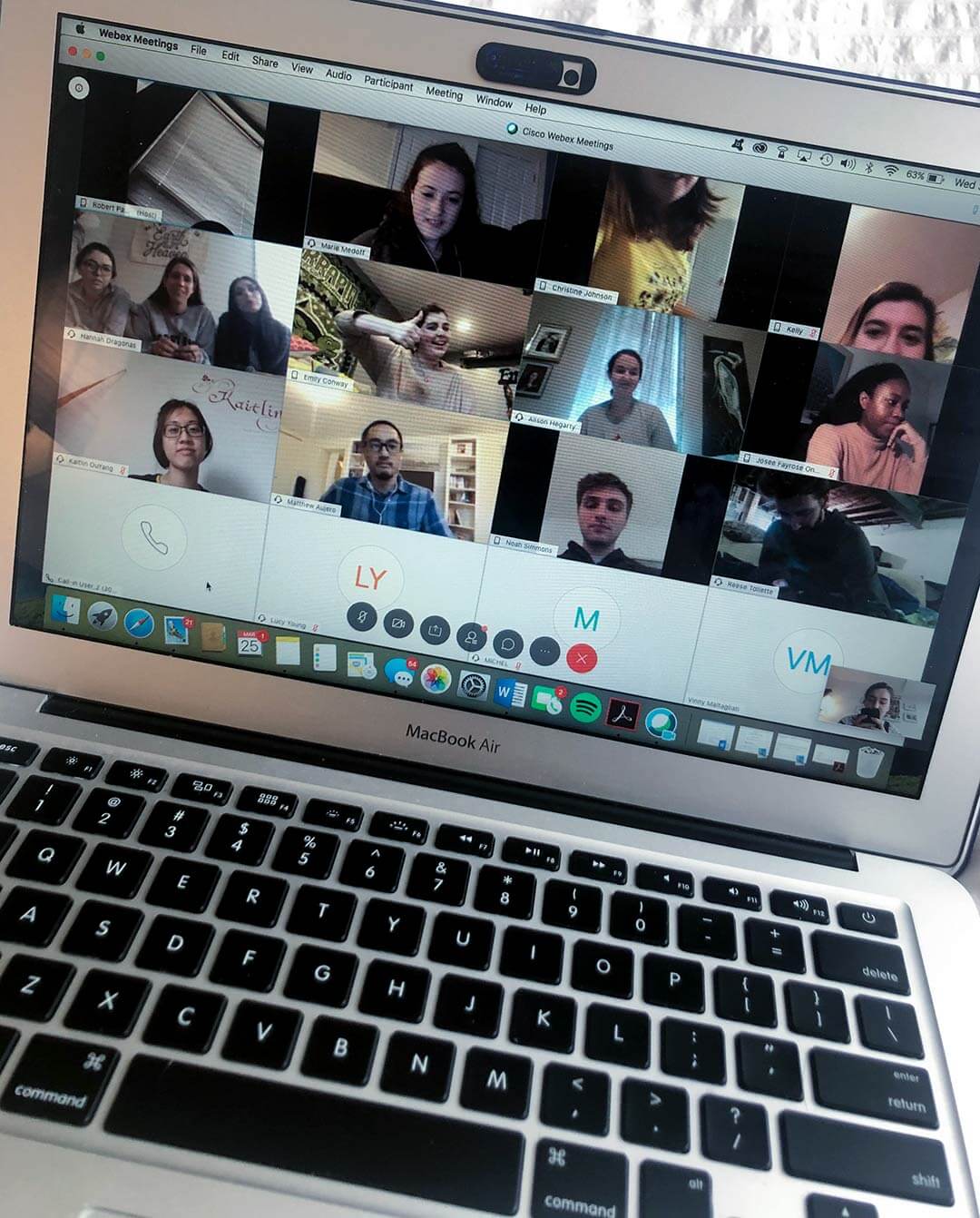- April 09, 2020
- By Maya Pottiger ’17, M.Jour. ’20
Terps are transitioning to online classes, and some are tuning in for online Masses.
With their congregations now spread across the country during the coronavirus pandemic, University of Maryland faith leaders are relying on web-based platforms to stay connected with students, especially during Holy Week and Passover.
“One of the sentences at the beginning of the Seder when we sit down is, ‘Let all who are hungry come and eat,’” said Rabbi Eli Backman, director of the Chabad Jewish Student Center at UMD. “We can’t do that in the physical sense this year, but we do want to be there to help everyone celebrate.”
For Passover, which began at sundown last night, Backman helped provide Seder plates and boxed meals for students who are still in the area. Partnering with D.C. restaurant CharBar, Backman had catered food delivered to Chabad, where nearly 150 students stopped by to pick up their orders.
Leading up to the eight-day holiday, Backman recorded a 30-minute how-to video on leading a Seder, considering many people will do this for the first time. In some branches of Judaism, it’s traditional not to use technology during religious observances, so he won’t be leading a Seder via videoconferencing tools.
Rabbi Ari Israel, executive director of Maryland Hillel, uses Zoom to meet with his Jewish Learning Fellowship class on Monday evenings and hosts a pre-Shabbat celebration hour on Fridays. Once the holiday is over, Backman will resume his weekly classes. Until then, his Virtual Programming page has downloadable resources for Passover.
 Father Rob Walsh, chaplain at the Catholic Student Center, lives just off campus. He is able to livestream Mass on YouTube from Memorial Chapel at 10 a.m. on Sundays and 5:30 p.m. on Wednesdays. About 475 people watched the most recent Sunday service.
Father Rob Walsh, chaplain at the Catholic Student Center, lives just off campus. He is able to livestream Mass on YouTube from Memorial Chapel at 10 a.m. on Sundays and 5:30 p.m. on Wednesdays. About 475 people watched the most recent Sunday service.
For Triduum, starting today, the Catholic Terps organization is directing congregants to the Archdiocese of Washington, where Archbishop Wilton D. Gregory will be streaming Mass from St. Matthew’s Cathedral. Walsh, known as Father Rob, will stream from Memorial Chapel at 10 a.m. on Easter Sunday.
Between services, Catholic Terps have 20 to 30 Bible study small groups that now hold their weekly meetings virtually. Lisa Lytwyn, coordinator of campus ministry at Catholic Terps, said students are grateful for the small groups, which help them feel connected in this time of isolation.
“There’s an opportunity in this difficult moment to connect more deeply with people, to connect more one-on-one through video calls and text messages,” Lytwyn said. “We are striving to support our students, and also our alumni, families and friends connected to the Catholic Student Center during this time.”
As president of the Catholic Student Center, M.J. Acevedo ‘20 was integral in helping transition the “active, in-person ministry to this new online world.” It’s pushed her to be in contact with Catholic students from other schools to share resources.
“We’re opening our virtual doors to anyone who’s in need of this community,” Acevedo said. “We wanted to help provide a place where people can have that normalcy and continue to have that community where they feel supported.”
Tarif Shraim, the Muslim chaplain at Maryland, said his congregation’s virtual sessions have attracted higher attendance than physical ones on campus. He continues to offer spiritual, mental and emotional support through Zoom meetings and phone calls to address more private needs. He also started a series of 15-minute videos that are spiritually oriented to provide guidance on dealing with anxiety, stress and hardship.
When Ramadan begins later this month, Shraim plans to increase the frequency of these video messages from once or twice a week to daily. He will also host a video call for reflection and prayers.
“Ramadan is a beautiful, sacred time, and it’s a lot of time for community and congregational acts,” he said. “That’s going to be missing.”
At the United Campus Ministry, the listserv, Instagram and Facebook accounts are all updated regularly to keep students informed. To help keep a sense of normalcy, Chaplain Holly Ulmer is leading weekly programs via Zoom at the same times they were held on campus.
For Holy Thursday, Good Friday and Easter services, Ulmer will provide her congregation with links to livestreams from area congregations, then she will hold a discussion on the theme of resurrection on Sunday evening.
“Faith ultimately helps people make sense of life,” she said. “Even though we’re all separated right now, we’re not alone. Faith also helps people make meaning in the midst of crisis.”
Ulmer acknowledged how sad college students, especially seniors, must be to have the semester cut off abruptly. She said humans struggle when things don’t go as planned, but while we might think we had one mission in life, it can change.
“What I want to share with young people is don’t lose hope that you won’t still be able to live out your dreams or whoever you’re called to be,” Ulmer said. “The future is still there.”
